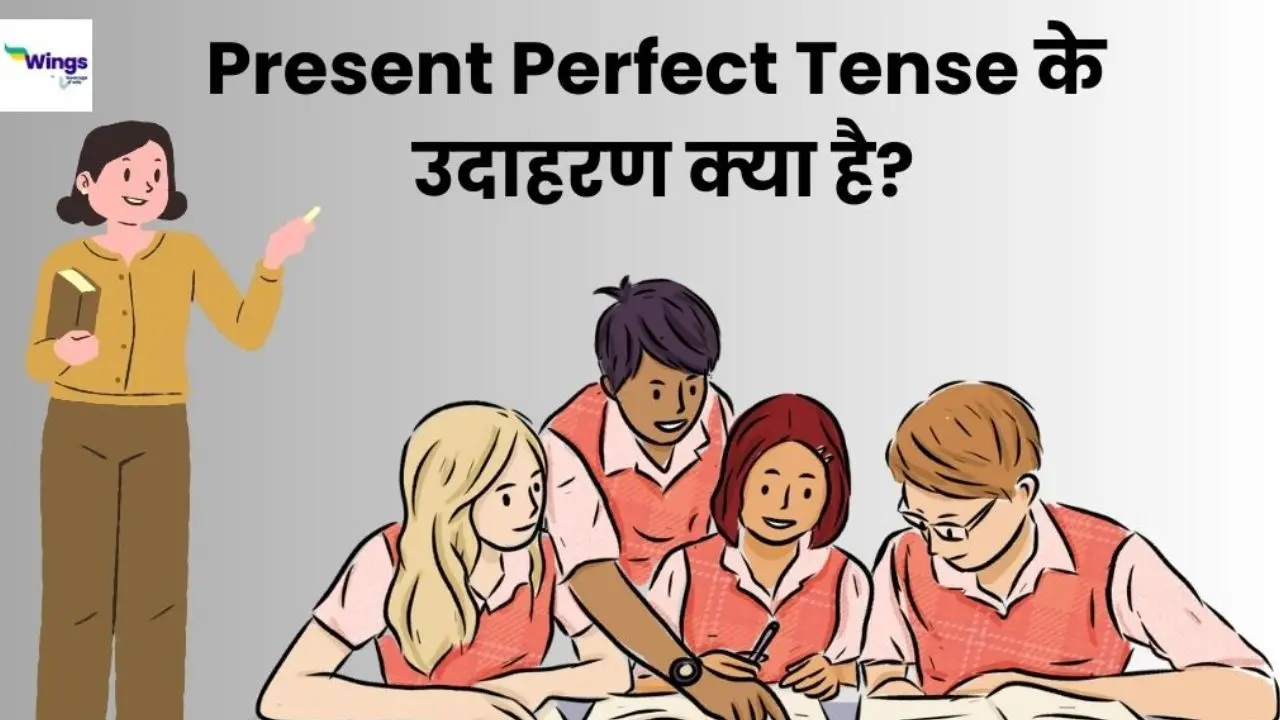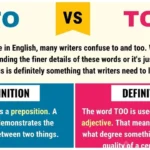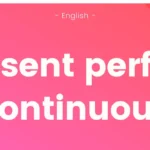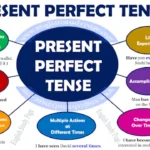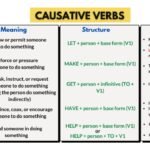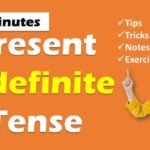Present Perfect Tense in Hindi| Present Perfect Tense को हिंदी में “वर्तमान पूर्ण काल” कहा जाता है। यह टेंस उस क्रिया को दर्शाता है जिसने वर्तमान के समय से पहले किया था और उसका संबंध वर्तमान समय तक चला गया है। इसमें क्रिया के कार्रवाई का असर वर्तमान समय तक भी महसूस होता है।
इसका प्रयोग निम्नलिखित स्थितियों में होता है:
किसी कार्रवाई या घटना के नतीजे को वर्तमान समय तक व्यक्त करने के लिए।
कोई कार्य जिसे पहले ही पूरा कर लिया गया हो, लेकिन उसका प्रभाव अभी भी महसूस हो रहा है।
उदाहरण:
मैंने अभी तक किताब पढ़ी है। (I have read the book so far.)
उसने अपना काम पूरा किया है। (He has finished his work.)
हम अभी तक उस जगह पर नहीं गए हैं। (We have not yet been to that place.)
इन वाक्यों में, “have” या “has” का प्रयोग किया गया है जो कि क्रियाओं के पूर्व के कारण या परिणाम को दर्शाते हैं, जो कि वर्तमान समय में भी महसूस हो रहे हैं।
Subject + has/have + V3 + Object
| Singular | Plural |
|---|---|
| i – Have | You – have |
| He – Has | We – have |
| She – Has | They – have |
| It – have | It’s – have |
| Name – has | Names – has |
| This – has | These – have |
| That – has | Those – have |
I have a pet dog. (मेरे पास एक पालतू कुत्ता है।)
He (वह):
He has a busy schedule today. (उसके पास आज एक व्यस्त कार्यक्रम है।)
She (वह):
She has a cat. – उसके पास एक बिल्ली है।
it (यह)
It has a tail. – इसके पास एक पूंछ है।
Name (नाम)
Name has a new job. – उसके पास एक नया काम है। (Here, “Name” would be replaced by an actual name.)
This (यह)
This has potential. – इसमें क्षमता है।
That (वह)
That has been done. – वह किया गया है।
You (तुम)
You have a book. – तुम्हारे पास एक किताब है।
We (हमलोग)
We have a plan. – हमारे पास एक योजना है।
They (वे लोग)
They have three children. – उनके पास तीन बच्चे हैं।
It’s (यह सब)
It’s name’s John. – इसका नाम जॉन है। (Here, “It’s” is short for “It is.”)
These (इनमे)
These have different colors. – इनमें विभिन्न रंग हैं।
Those (उनमे)
Those have wings. – उनमें पंख हैं।
| Singular | Plural |
|---|---|
| I (मैं): I have a pet dog | You (तुम) You have a book |
| He (वह): He has a busy schedule today. | We (हमलोग) We have a plan. |
| She (वह): She has a cat. | They (वे लोग) They have three children |
| it (यह) It has a tail | It’s (यह सब) It’s name’s John |
| Name (नाम) Name has a new job (Sita, Gita, Rahul) | Name’s (नाम) Sita and Gita has a pen |
| This (यह) This has potential | These (इनमे) These have different colors |
| That (वह) That has been done | Those (उनमे) Those have wings |
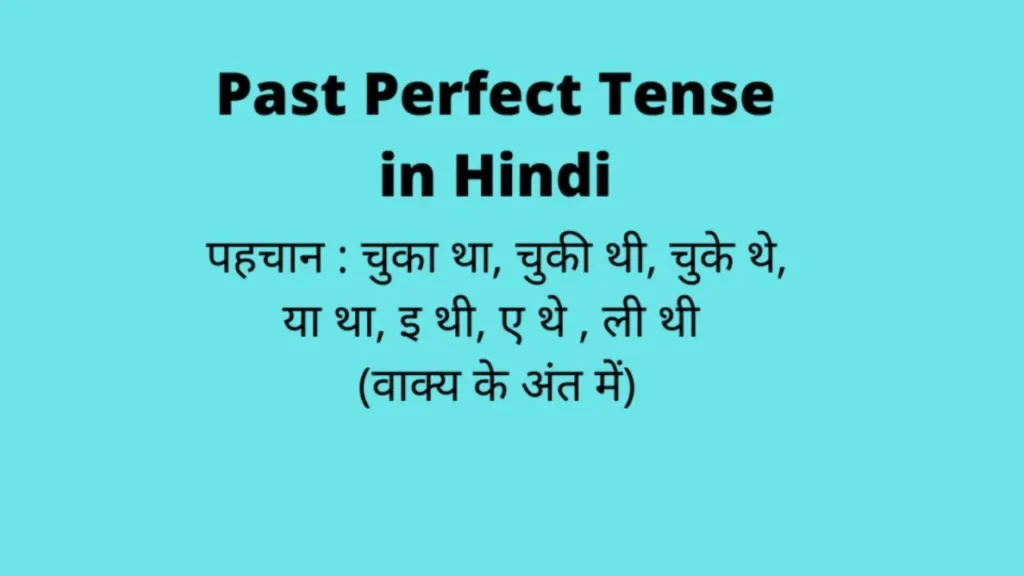
10 Rules And Uses
Rule 1 : A Present Completed action having it’s affect on present is kept in Present Perfect Tense. एक वर्तमान पूर्ण कार्रवाई है जो वर्तमान में प्रभावित है, वर्तमान सही काल में रखा गया है।
Examples :
- She has finished her homework. (उसने अपना होमवर्क पूरा कर लिया है।)
- He has completed the project. (उसने परियोजना को पूरा कर लिया है।)
- They have tidied up the room. (उन्होंने कमरे को साफ कर लिया है।)
- The chef has cooked delicious food. (शेफ ने स्वादिष्ट खाना बना लिया है।)
- She has learned to play the guitar. (उसने गिटार बजाना सीख लिया है।)
- He has written a book. (उसने एक किताब लिखी है।)
- They have bought a new car. (उन्होंने एक नई कार खरीद ली है।)
- She has painted the house. (उसने घर को रंगा है।)
- He has repaired the computer. (उसने कंप्यूटर की मरम्मत कर ली है।)
- They have adopted a puppy. (उन्होंने एक कुत्ते को गोद लिया है।)
Rule 2 : If today denotes passed time for the day is kept in Present Perfect Tense. (यदि आज दिन के लिए पारित समय को दर्शाता है तो वर्तमान में सही तनाव में रखा जाता है।)
Examples :
- I have already completed my tasks for today. (मैंने आज के कार्यों को पहले से ही पूरा कर लिया है।)
- She has already left for the airport this morning. (उसने आज सुबह ही हवाई अड्डे के लिए निकल चुकी है।)
- They have already finished their breakfast today. (उन्होंने आज का नाश्ता पहले से ही कर लिया है।)
- He has just received an important phone call this afternoon. (उसने आज दोपहर में ही एक महत्वपूर्ण फोन कॉल प्राप्त किया है।)
- She has already met with the clients today. (उसने आज के ग्राहकों से पहले ही मिल लिया है।)
- They have visited the museum this morning. (उन्होंने आज सुबह म्यूजियम को देखा है।)
- He has already submitted the report today. (उसने आज रिपोर्ट पहले से ही सबमिट कर दी है।)
- She has already gone shopping today. (उसने आज खरीददारी पहले से ही कर ली है।)
- They have already watched the movie this evening. (उन्होंने आज शाम को फिल्म पहले से ही देख ली है।)
- He has already cooked dinner tonight. (उसने आज रात का खाना पहले से ही पका लिया है।)
Rule 3 : Always, never, Seldom, Often, Rarely, etc can be used in this for competed action. (अल्विस, नेवर, सेल्डन, अक्सर, रेरीली, आदि का उपयोग प्रतिस्पर्धा कार्रवाई के लिए किया जा सकता है।)
Examples :
- She has always been a good student. (उसने हमेशा अच्छा छात्र रहा है।)
- He has never visited Europe. (उसने कभी भी यूरोप नहीं गया है।)
- They have seldom complained about the service. (उन्होंने बहुत कम बार सेवा के बारे में शिकायत की है।)
- She has often helped her friends. (उसने अक्सर अपने दोस्तों की मदद की है।)
- He has rarely missed a deadline. (उसने बहुत कम बार किसी समय सीमा को मिस किया है।)
Rule 4 : Already, just just now, so far, recently etc are used in Present Perfect Tense For Completed action. (पहले से ही, अभी, अभी तक, अभी तक, हाल ही में आदि का उपयोग पूर्ण कार्रवाई के लिए वर्तमान सही काल में किया जाता है।)
Examples :
- She has already finished her meal. (उसने पहले से ही अपना भोजन पूरा कर लिया है।)
- They have just arrived at the airport. (उन्होंने अभी हाल ही में हवाई अड्डे पर आना है।)
- He has so far completed half of the project. (उसने अभी तक परियोजना का आधा हिस्सा पूरा कर लिया है।)
- She has recently started learning French. (उसने हाल ही में फ्रेंच सीखना शुरू किया है।)
- They have already watched the new movie. (उन्होंने पहले से ही नई फिल्म देख ली है।)
Rule 5 : first time, second time, third time etc + Present Perfect Tense. (पहली बार, दूसरी बार, तीसरी बार आदि + वर्तमान सही तनाव।)
Examples :
- This is the first time he has visited India. (यह उसकी पहली बार है जब उसने भारत देखा है।)
- It was the second time she had won the competition. (यह उसकी दूसरी बार थी जब उसने प्रतियोगिता जीती थी।)
- He has called his parents for the third time today. (उसने आज तीसरी बार अपने माता-पिता को फोन किया है।)
- They have already visited this museum four times. (उन्होंने इस संग्रहालय को पहले से ही चार बार देख लिया है।)
- It was the fifth time he had missed the train. (यह उसकी पांचवीं बार थी जब उसने ट्रेन मिस की थी।)
Rule 6 : It is / this is + the best / The worst etc + Present Perfect Tense. ( : यह है / यह + सबसे अच्छा / सबसे खराब आदि है + वर्तमान सही तनाव।)
Examples :
- She is the best singer I have ever heard. (वह सबसे अच्छी गायिका है जिसको मैंने कभी सुना है।)
- This is the worst decision he has made in his life. (यह उसका जीवन में सबसे बुरा फैसला है।)
- It is the most exciting book I have read recently. (यह हाल ही में मैंने पढ़ी सबसे रोमांचक पुस्तक है।)
- This is the most delicious cake she has ever baked. (यह वह सबसे स्वादिष्ट केक है जिसे उसने कभी बनाया है।)
- It’s the worst storm we have experienced in years. (यह सालों में हमारे सबसे खराब तूफान है।)
Rule 7 : Last, past, before, yesterday, then ago, Earlier, privious, that time etc in Present prefect for a completed action, They come in past Structure. (अंतिम, अतीत, पहले, कल, फिर, पहले, पहले, विशेष रूप से, उस समय आदि एक पूर्ण कार्रवाई के लिए वर्तमान प्रीफेक्ट में, वे पिछली संरचना में आते हैं।)
Examples :
- She finished her work yesterday. (उसने कल अपना काम पूरा कर लिया।)
- We visited Paris last summer. (हमने पिछले गर्मी पेरिस घूमने गए थे।)
- He had dinner before he left. (उसने जाने से पहले रात का खाना कर लिया था।)
- They met five years ago. (उन्होंने पांच साल पहले मिला था।)
- I read that book then. (मैंने उस समय वह पुस्तक पढ़ी थी।)
Rule 8 : Present Perfect Tense + Since + past Indefinite. (वर्तमान सही तनाव + चूंकि + अतीत अनिश्चितकालीन।)
Examples
- She has been working here since 2010. (वह 2010 से यहां काम कर रही है।)
- They have been friends since childhood. (वे बचपन से ही दोस्त हैं।)
- He has lived in this city since birth. (उसने जन्म से इस शहर में रहा है।)
- She has been learning Spanish since last year. (उसने पिछले साल से स्पेनिश सीख रही है।)
- They have been married since 2005. (उनकी शादी 2005 से हो गई है।)
Rule 9 : For / Since can be used in distance to show time for a completed action. (: के लिए / चूंकि एक पूर्ण कार्रवाई के लिए समय दिखाने के लिए दूरी में उपयोग किया जा सकता है।)
Examples
- He has been studying for three hours. (वह तीन घंटे से पढ़ाई कर रहा है।)
- She has been waiting for him since morning. (उसने सुबह से उसका इंतजार कर रही है।)
- They have been living here for five years. (वे पांच साल से यहां रह रहे हैं।)
- He has been practicing yoga for a long time. (उसने बहुत समय से योग का अभ्यास कर रहा है।)
- She has been working in this company since graduation. (उसने स्नातक होने के बाद से इस कंपनी में काम किया है।)
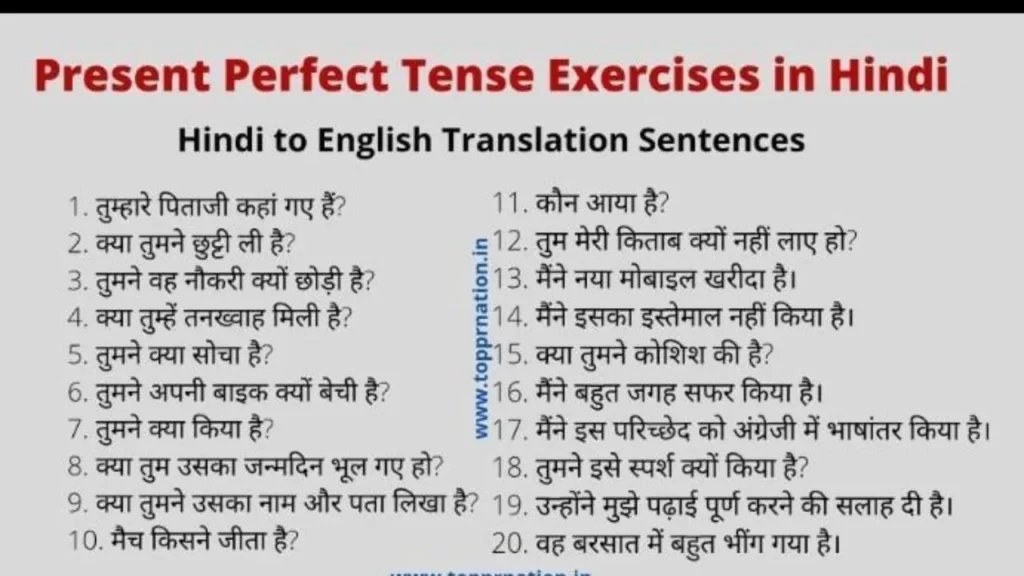
Present Perfect tense in Sentences
Affirmative Sentences:
वह वाक्य जो किसी तथ्य या दावे को व्यक्त करता है। जिस वाक्य का कोई अर्थ हो या फिर कोई कार्य हो रहा है|
- She reads books. – वह किताबें पढ़ती है।
- They play football. – वे फुटबॉल खेलते हैं।
- He eats fruit. – वह फल खाता है।
- I study English. – मैं अंग्रेज़ी पढ़ता/पढ़ती हूँ।
- We go to school. – हम स्कूल जाते हैं।
- They speak French. – वे फ्रेंच बोलते हैं।
- She teaches Mathematics. – वह गणित पढ़ाती है।
- He works in an office. – वह दफ्तर में काम करता है।
- It rains in summer. – गर्मी में बारिश होती है।
- The dog barks loudly. – कुत्ता जोर से भौंकता है।
Negative Sentences:
वह वाक्य जो किसी चीज़ के अस्तित्व या घटना को इनकार करता है। जिससे ना का बोध हो यानी कोई कार्य करने से इंकार किया जा रहा हो|
- She does not read books. – वह किताबें नहीं पढ़ती।
- They do not play football. – वे फुटबॉल नहीं खेलते।
- He does not eat fruit. – वह फल नहीं खाता।
- I do not study English. – मैं अंग्रेज़ी नहीं पढ़ता/पढ़ती हूँ।
- We do not go to school. – हम स्कूल नहीं जाते।
- They do not speak French. – वे फ्रेंच नहीं बोलते।
- She does not teach Mathematics. – वह गणित नहीं पढ़ाती।
- He does not work in an office. – वह दफ्तर में काम नहीं करता।
- It does not rain in winter. – सर्दी में बारिश नहीं होती।
- The dog does not bark at night. – कुत्ता रात में नहीं भौंकता।
Interrogative Sentences:
वह वाक्य जो सवाल पूछता है और उसमें प्रश्न चिह्न होता है।
- Does she read books? – क्या वह किताबें पढ़ती है?
- Do they play football? – क्या वे फुटबॉल खेलते हैं?
- Does he eat fruit? – क्या वह फल खाता है?
- Do I study English? – क्या मैं अंग्रेज़ी पढ़ता/पढ़ती हूँ?
- Do we go to school? – क्या हम स्कूल जाते हैं?
- Do they speak French? – क्या वे फ्रेंच बोलते हैं?
- Does she teach Mathematics? – क्या वह गणित पढ़ाती है?
- Does he work in an office? – क्या वह दफ्तर में काम करता है?
- Does it rain in summer? – क्या गर्मी में बारिश होती है?
- Does the dog bark loudly? – क्या कुत्ता जोर से भौंकता है?
Assertive Sentences:
वह वाक्य जो किसी बयान को व्यक्त करता है या किसी तथ्य को व्यक्त करता है।
- Water boils at 100 degrees Celsius. – पानी 100 डिग्री सेल्सियस पर उबलता है।
- The sun rises in the east. – सूर्य पूरब में निकलता है।
- Birds chirp in the morning. – पक्षियाँ सुबह चहचहाती हैं।
- Computers are useful machines. – कंप्यूटर उपयोगी मशीनें हैं।
- Plants need sunlight to grow. – पौधों को बढ़ने के लिए सूरज की रोशनी की आवश्यकता होती है।
- English is spoken in many countries. – अंग्रेज़ी कई देशों में बोली जाती है।
- The Earth revolves around the sun. – पृथ्वी सूर्य के चारों ओर घूमती है।
- Fish live in water. – मछलियाँ पानी में रहती हैं।
- The moon shines at night. – चाँद रात में चमकता है।
- Elephants are large animals. – हाथी बड़े जानवर होते हैं।
Exclamatory Sentences:
वह वाक्य जो मजबूत भावना या उत्साह को व्यक्त करता है और एक विस्मयादिवाचक चिह्न से समाप्त होता है।
- What a beautiful flower this is! – यह कितना सुंदर फूल है!
- What delicious food they cook! – वे कितना स्वादिष्ट खाना पकाते हैं!
- What an interesting story that was! – वह कितनी रोचक कहानी थी!
- What a talented singer she is! – वह कितनी प्रतिभाशाली गायिका है!
- What a loud noise it makes! – यह कितनी जोरदार ध्वनि निकालता है!
- What a hot day it is today! – आज कितना गरम दिन है!
- What a funny joke you told! – तुमने कितना मजेदार जोक बोला!
- What an amazing view! – कितनी आश्चर्यजनक दृश्य है!
- What a long journey it was! – वह कितनी लंबी यात्रा थी!
- What a surprise this party is! – यह कितनी अचानक पार्टी है!
Continuation of examples:
- This is the best movie I have watched. (यह सबसे अच्छी फिल्म है जो मैंने देखी है।)
- He wrote his last exam yesterday. (उसने कल अपनी अंतिम परीक्षा दी थी।)
- She has been learning French since last year. (वह पिछले साल से फ्रेंच सीख रही है।)
- They have been waiting for you since morning. (वे सुबह से तुम्हारा इंतजार कर रहे हैं।)
- He has been living in Mumbai for ten years. (वह दस साल से मुंबई में रह रहा है।)
- This is the worst food I have ever tasted. (यह सबसे खराब खाना है जिसे मैंने कभी चखा है।)
- She finished her assignment last night. (उसने कल रात अपने असाइनमेंट को समाप्त किया।)
- He has been working here since his graduation. (वह अपने स्नातक होने के बाद से यहां काम कर रहा है।)
- They have known each other for twenty years. (वे बीस सालों से एक-दूसरे को जानते हैं।)
- She has been waiting for this moment since childhood. (वह बचपन से ही इस पल का इंतजार कर रही है।)
- This is the best day I have had in a long time. (यह लंबे समय से मेरे पास सबसे अच्छा दिन है।)
- He visited his grandparents last summer. (उसने पिछले गर्मी अपने दादा-दादी के पास जाया था।)
- She has been studying English since last month. (वह पिछले महीने से अंग्रेजी पढ़ रही है।)
- They have been married for twenty-five years. (वे पाँच वीं साल से शादीशुदा हैं।)
- He has been playing tennis for two hours. (वह दो घंटे से टेनिस खेल रहा है।)
- This is the worst mistake he has ever made. (यह उसकी ज़िन्दगी का सबसे बड़ा ग़लती है।)
- She finished her project last week. (उसने पिछले हफ़्ते अपना परियोजना पूरा किया।)
- He has been working since early morning. (वह सुबह-सुबह से काम कर रहा है।)
- They have been friends since childhood. (वे बचपन से ही दोस्त हैं।)
- She has been waiting for this opportunity for years. (वह सालों से इस अवसर का इंतजार कर रही है।)
Exercise: Fill in the blanks with the correct form of the verb in Present Perfect tense (वर्तमान सही तनाव):
मैंने अभी तक उस पुस्तक को _………. (पढ़ लिया / पढ़ा है)।
उसने अपना काम …………..(किया है / किया)।
हमने उसे पिछले सप्ताह से ………..(जानते हैं / जाना है)।
तुमने कभी इसे……….. (सुना है / सुना)।
वे इस शहर में………… (रह चुके हैं / रहते हैं)।
मैंने अभी तक अपना काम……….. (खत्म किया है / खत्म किया)।
उसने अपने फोन को…………. (खो दिया है / खो दिया)।
उसने अभी तक इस मुद्दे पर …………..(सोचा है / सोचा है)।
हमने उसे कहा था कि हम ……………(आए हैं / आ गए हैं)।
तुमने कभी उसकी मदद _……………. (की है / की हैं)।
Answers:
- पढ़ लिया है
- किया है
- जानते हैं
- सुना है
- रह चुके हैं
- खत्म किया है
- खो दिया है
- सोचा है
- आ गए हैं
- की है
Simple Sentences:
- मैंने अभी तक उस पुस्तक को पढ़ लिया है। (I have already read that book.)
- उसने अपना काम किया है। (He has done his work.)
- हमने उसे पिछले सप्ताह से जानते हैं। (We have known him since last week.)
- तुमने कभी इसे सुना है। (Have you ever heard this?)
- वे इस शहर में रह चुके हैं। (They have lived in this city.)
- मैंने अभी तक अपना काम खत्म किया है। (I have finished my work.)
- उसने अपने फोन को खो दिया है। (He has lost his phone.)
- उसने अभी तक इस मुद्दे पर सोचा है। (He has not yet thought about this issue.)
- हमने उसे कहा था कि हम आ गए हैं। (We had told him that we have arrived.)
- तुमने कभी उसकी मदद की हैं। (Have you ever helped him?)
Read Also:
- Present Continuous Tense के बारे जाने डिटेल्स से, रूल्स, स्ट्रक्चर और एक्साम्प्लेस के साथ
- Present Perfect Continuous Tense In Hindi: Rules, Structure and Examples
- 100 Sentences Of Present Continues tense In Hindi
- Present Perfect Tense सीखे हिंदी में | परिभाषा, नियम और उदहारण के साथ
- Model Verbs: हिंदी में सभी मॉडल्स का सही उपयोग कैसे करे?
- Use Of Shall have to and Will have to In Hindi: का सही प्रयोग हिंदी में कैसे करे?
